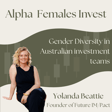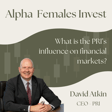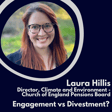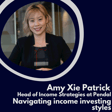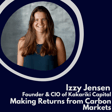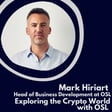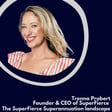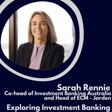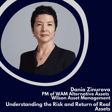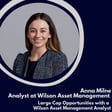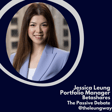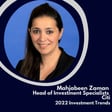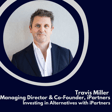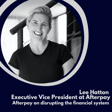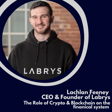Introduction to Podcast and Hosts
00:00:03
Speaker
Welcome back to the Alpha Females and Best Podcast, two females working in the finance industry searching for alpha. My name is Clooney. And I'm Emily. And together we bring diversified perspectives from the buy and sell side of the finance world.
00:00:18
Speaker
As usual, any information discussed in this podcast is not financial advice. All opinions reflect those of the individuals and this podcast is for educational purposes only. You should always read the PDS and talk to a financial advisor who can consider your personal circumstances before you invest.
Meet Karen Chan: An Expert in Her Field
00:00:36
Speaker
Today, we're really excited to have Karen Chan from Perennial Partners' Private to Public team. Karen commenced with Perennial in July this year and is a Senior Investment Director. She works in the Private Investment team, which has over $500 million in funds under management and three different funds.
00:00:56
Speaker
and she has 18 years of experience in investments, investment banking, consulting, and law. Prior to joining Perennial, Karen was the head of emerging companies at Investech, where she was responsible for overseeing the bank's principal investments as well as early stage fund investments in the Investech Emerging Companies Australia Fund 1. She also has experience with Gresham Partners, Morgan Stanley, and JP Morgan. So it is safe to say that we're in good hands with this episode to discuss the pre-IPO market. Welcome, Karen.
00:01:26
Speaker
Thanks, Emily. I'm really pleased to speak with you in cleaning today. So Karen, we do like to kick off every episode with the same question and luckily we probably gave you a hint on this in advance.
Early Career Lessons: Dress Codes Matter
00:01:38
Speaker
Can you tell us what is your most embarrassing career moment?
00:01:41
Speaker
I had to think about it and it takes me back down memory lane so in my first job I had to go on a business trip for a few days and it was also my first work trip and it was an early morning flight and part of the itinerary was that we would go to the hotel first so I rocked up to the airport in my casual clothes thought it was all fine and then until I got off the plane and
00:02:04
Speaker
saw the associate who I was travelling with. She gave me a bit of a dressing down that I was not dressed in a work attire. So we went to the hotel and I got changed back into my suit and then she actually comes up to me with three boxes and said, here are the due diligence materials. We're not going anywhere today.
00:02:22
Speaker
can play sort through these and put together an index. So I thought it was a bit strange at the time, but I was also really embarrassed. So I think from then on, I think, I guess if in doubt, just always ask what the dress code is.
00:02:34
Speaker
I think that's a funny one. We've definitely had a few dress code embarrassing moments, haven't we, Em? We've had pants situation gone wrong. We've had a swimming situation gone a little wrong. So there does seem to be a feud in the dress code area that people really, really sticks with people as one of their most embarrassing moments. Who wants to wear corporate clothes on a plane anyway? It's so uncomfortable.
00:02:58
Speaker
So, let's dive into a bit more about your career and the topic of conversation today, which is the pre-IPO market. Could you please give us a bit of a background about how you ended up at Perennial?
Career Path: From Banking to Perennial Partners
00:03:10
Speaker
Sure. So, I think you gave a really great background on me in the introduction, but I might just start back to how I started my career and actually started in investment banking straight out of university. And it was a really great training ground because I got to
00:03:25
Speaker
learn how to use Excel, PowerPoint, and also join meetings with a lot of C-suite executives.
00:03:31
Speaker
And I started out with JP Morgan, where I was covering technology companies. And then I also moved over to Morgan Stanley. So I spent about 10 years with both those companies combined, that is. And I guess relevant to my current job now, I actually spent a lot of time working with companies to assess whether they were IPO ready and whether we would want to sponsor them as a lead manager on their IPO. So I think the difference now is that I'm now on the other side and actually looking at whether they're key selling points actually makes sense.
00:04:02
Speaker
I also left the industry and actually spent some time consulting with early stage businesses and then also retrained as a lawyer as I studied commerce law and worked at Gerleach. So I was the global legal counsel and then I returned back to banking and I worked with aggression partners.
00:04:18
Speaker
And then most recently I was with Investech where I spent a lot of time working with high growth early stage businesses as the head of emerging companies and really enjoyed that experience. So what happened is at Investech, they decided to exit the Australian market. So Australia was actually the third largest market, but they decided to exit, I think announced end of last year and around the same time perennial, I think decided to sort of grow their team.
00:04:47
Speaker
off the back of the success of their private investment strategy. There was an opportunity for me to join. I also actually knew the team because we actually had a common investment. I guess the timing just happened to align and I'm really excited to be with Perennial now. That is one diverse career background if I've ever heard one, finance to law and back to finance is pretty impressive.
00:05:09
Speaker
You clearly alluded to the experience you've had with companies and bringing them to the IPO market, which I think a lot of our listeners are familiar with. But to take it really simply, you can ask, what is a pre-IPO fund?
Understanding Pre-IPO Companies and Perennial's Role
00:05:22
Speaker
Can you just define that and what it means for the company to be in a pre-IPO stage?
00:05:26
Speaker
So pre IPO fund means that it's investing in companies that are at the pre IPO stage. I would say at Perennial we are a bit broader than that because our funds also invest in another bucket which is the unlisted private stage which is one stage earlier than the pre IPO stage.
00:05:46
Speaker
And to explain what it means to be a pre IPO company, it means that the company is due to list typically within a six to 18 month period. And sometimes this can be up to 24 months. Usually the business is already in preparation for an IPO. So they should already be looking to fill in key management positions, have an IPO ready board, as well as have their accounts audited. So that's what we would look at when we're
00:06:14
Speaker
you know, seeing whether a company is at the pre IPO stage. Also, I think another thing to add is that at the pre IPO stage, a lot of the pre IPO funds, including ourselves, would also invest fire a convertible note structure. So what that means is we would actually get a discount to the IPO price on the conversion of the convertible note. And that conversion discount is usually between 20 to 25%.
00:06:43
Speaker
sometimes higher, and there is a time-based ratchet sometimes. So the longer it takes for the company to IPO, then the higher the discount. Typically these notes, as mentioned, would be anywhere between six months to 24 months.
00:06:58
Speaker
That's really interesting that you can have, I guess, time-based discount for how long it takes to transition a company to IPO. That obviously provides
Navigating IPO Challenges and Benefits
00:07:06
Speaker
an incentive for a company to get up and running at IPO more quickly, given you as an investor get less of a discount. Is that ever seen as a negative if they rush to IPO too quickly? Yeah. Actually, that's a really good point because sometimes
00:07:22
Speaker
When companies come to us and they actually may not actually be ready for an IPO, we may actually encourage them not to, I guess, use that structure. And we may actually say, you actually fit our earlier bucket.
00:07:35
Speaker
and we would then potentially invest by a straight equity structure if you really like the business. But I think in general, having that convertible note structure actually aligns us with the company, and so it ensures both parties are sort of on that same track. But as investors, we do take a very long-term view, so we do want also structure that makes the most sense for the company.
00:07:57
Speaker
Yeah, absolutely. And I guess that kind of ties into our next question, which is, you know, at what stage does a pre IPO company become an actual IPO? Is this kind of just the next part of the business journey?
00:08:11
Speaker
Yes, so I actually view the IPO as not the end point of a journey, but it's actually the beginning because it's actually the next phase for a company. And when a company decides to go IPO, to actually be IPO ready, the business does need to elevate itself on many levels, including the governance. But an IPO is actually not for everybody. So I would say
00:08:34
Speaker
Companies need to think about whether they are okay with the increased disclosure obligations, more scrutiny, as well as the ongoing costs to be listed. But at the same time, I do think it is a very rewarding because it is a major liquidity event. So early investors can have the opportunity to exit or actually see the value of their stake, also appreciate on a listed exchange, but then have the ability to exit at any time.
00:09:01
Speaker
subject to escrow arrangements. There's also significant prestige and credibility to being a listed company and actually may help a company acquire new customers and new hires. Because the company does have that baseline level of governance, I think what this means is that
00:09:21
Speaker
it really gives customers and suppliers more confidence and comfort in a business. And they'll also then have M&A currency in the form of Scripp. So that gives them more flexibility to acquire either another listed company or another private company. And they can also raise capital much easier and faster than in the private markets. And just to sort of add to that,
00:09:44
Speaker
our funds also give us the ability to also participate in those placements, which can actually happen overnight. Karen, you just touched on your funds then. I'd love to explore that a little bit more. Can you tell us what are the perennial pre-IPO funds and I guess how have they performed for our listeners
00:10:00
Speaker
you know, what key aspects are you looking at to include a company in the fund and how's that been going?
Perennial's Fund Performance and Strategy
00:10:07
Speaker
Sure. So I might just start off with a quick introduction about Perennial. So Perennial is a house of boutiques and it was founded over 20 years ago by well-known investor John Murray. So we are well known as a listed fund manager.
00:10:20
Speaker
But around two years ago, we started a new boutique called the Private Investments team. And we essentially identified a gap in the investing space where we could provide significant value to our investor base by being a dedicated investor in private.
00:10:38
Speaker
As mentioned, we run a private to public opportunities fund strategy. We've got three of these funds now, and we invest in three buckets. One is unlisted, second is pre-IPO, and third is in selected IPOs and placements. I actually personally think it is a very unique strategy because investors get the benefits of both the private and listed markets. It's also quite desirable from an investor point of view because
00:11:04
Speaker
we're actually able to smooth returns for them. Many private funds out there, such as in the VC and PE world, would have what you call a J curve, which means that in the initial years, the returns are actually negative because they're in deployment mode. During that period, you are waiting for your investments to perform, but you're also incurring expenses.
00:11:26
Speaker
So, we don't really have that issue because we can immediately participate in IPOs and placements, and also some pre-IPOs which could actually come to market quite quickly. And I think the great thing is that it means that we are actually sort of providing a return to investors from day one. And our funds have actually performed really well, so our fun one, which
00:11:50
Speaker
started two years ago I think in August 2019 it has returned 113.9% up to October 2021 and that's inclusive of distributions but net of fees. I might add actually that our funds also have the ability to provide distributions as well if it makes sense that we do that sort of every year and fund two has returned 10.3% so we only closed that in September last year but it's trading in line with expectations with how fund one has performed
00:12:18
Speaker
And then our fund 3, which we only just closed in August, is up 1.1%. So I'd say what you're probably seeing now is that these funds do take a bit of time to mature, and we expect increased performance over time. Yeah, that makes sense, because I'm guessing you hold the companies at book value until they have a valuation event or another capital raising. Is that correct?
00:12:43
Speaker
That's right, Emily. So we don't change the valuation of our investments, even if, say, they're knocking it out of the park, unless there is a third party valuation, if it's in the private space, or obviously if it's listed, then it is marked to what the closing price is on the listed exchange.
00:13:03
Speaker
Yeah, great. And can you talk a little bit to why pre-IPO funds like perennials should and are close-ended?
Why Pre-IPO Funds are Close-Ended
00:13:11
Speaker
And I guess what we mean by that is that there's two types of funds. You can have open-ended and close-ended. Close-ended means you do the raising up front and additional investors can't invest in that fund post that raising close date. First, an open-ended, which you can come in and out as you please. So why is the pre-IPO market kind of more geared towards the close-ended funds structure?
00:13:33
Speaker
That's a great question. I think the reason is quite simply because in the private space, the investments are actually fairly illiquid until they become sold in M&A or until they become listed on an exchange. The fact is most of our investments are actually tied up in the private space and by definition, they're illiquid. If we have investors that want to
00:13:56
Speaker
take money out of the fund, that is a bit of a problem because those positions are quite difficult to trade. Although I guess what I'm seeing is that in the market, there is increasingly more liquidity. So there are even secondary funds popping up that can invest or take secondary positions.
00:14:13
Speaker
but often they would actually take those positions at a slight discount. So it does make sense, I think, to have these funds as close ended. Thanks, Karen. You just mentioned, I guess, that a lot of those investments can be fairly illiquid. Is that why these types of products are really only available to wholesale investors? And I guess second to that question, do you see this industry or this space being disrupted going forward so that it can be invested by a wider audience?
00:14:42
Speaker
Yeah, so I might actually just start off with who is a wholesale investor. And so that's typically someone that has net assets of $2.5 million or has gross income of $250,000 per annum for the last two years. And you typically also need to get a certificate from
00:15:01
Speaker
your accountant to certify that you are a wholesale investor. So these investments are not, I guess, closed off to your ordinary investor because they're closed ended and illiquid. I think it does play into it a little bit, but I think the key thing is that these are risky investments. So it's higher on the risk curve. And secondly, if
00:15:21
Speaker
a product is actually offered to wholesale investors, then these investors are generally exempt from getting regulated disclosure documents. So we do have obviously an IM information memorandum with details about our fund, but I think the details around each of the investments, while we do seek to provide a lot of information, may not be as detailed as what you would get under a regulated investment product such as, you know, an IPO where there's a lot of disclosure.
00:15:50
Speaker
So that's one of the reasons why it's not offered more broadly. It's all very topical right now. And I think in terms of whether we should be offering these investments to a broader class of investors, such as your retail investors. But I do think that the rules are there for a reason. But I mean,
00:16:10
Speaker
to put in context these rules have been around for 20 years now and it may be right for review because actually currently the net asset test of 2.5 million actually captures a lot more Australians than 20 years ago due to the you know significant rise in housing prices here in Australia. I think there could be more ways in which we could make this more inclusive to a broader set of investors because just because you
00:16:39
Speaker
meet these tests. These tests are very financial, but does not mean that you are actually financially savvy. So I think there are discussions around maybe we could have like a test or some sort of questionnaire so that we could maybe capture more investors. So I'd be interested to see where the regulations go with this regard.
00:16:58
Speaker
Yeah, that's interesting. And I guess we've had a pretty healthy IPO market in the last couple of years. We've seen a lot of companies come to market, some of the busiest M&A that has been seen for some time. Are you seeing that increasing deal flow in the private markets as well? Definitely. I'd say my team has seen over 550 deals last year.
00:17:21
Speaker
And this year, I think we've seen over 700 deals just this year.
Trends in Global Private Markets
00:17:26
Speaker
And the deal flow doesn't seem to be stopping right now. So I think usually we would expect things to slow down a bit in the lead up to Christmas, but there's definitely a lot of activity. So I think sentiment is generally fairly good.
00:17:41
Speaker
And I think what's driving this is there's actually a lot more capital in the private markets. And so you're seeing real growth in the venture capital as well as pre IPO markets. So all of these participants actually help provide more funding to companies.
00:17:58
Speaker
these companies, if they're growing, then we're actually seeing more interest, I think, at all stages. Second to that question that Emily just asked, Karen, I guess what are some of the global trends you're seeing in private markets? Are we seeing industry consolidation or are we seeing increasing M&A? Our companies want to retreat from listing publicly. Can you just talk to those dynamics a little bit more? Sure. I think you're seeing all of the above.
00:18:27
Speaker
But i do think that there are many companies that are wanting to stay private longer and i think they're able to do that because there's now more capital dedicated to the private markets so i think in the past a lot of companies that would come to us for example would have to go to
00:18:45
Speaker
the public markets, but now they have more choice. Globally, you're also seeing a lot of funds like ours, which are called crossover funds, and their participation in the market has continued to increase. I think, for example, in the US this year, I think they've participated in over US $100 billion in deals.
00:19:07
Speaker
This is definitely an area which we're seeing a lot more growth. You're also seeing listed funds, I guess, go down the curve and play in this pre-IPO space like Perennial has. And I think equally you're starting to see purely private funds move public. So I've seen like say SquarePEG, which is a venture capital firm, you know, they now have a dedicated technology fund focused on the listed space. You're also seeing globally Sequoia, one of the most well-known
00:19:37
Speaker
Venture capital firms just recently announced that they now have an evergreen fund structure so that they can back their portfolio companies from the very earlier stages and also stay invested in those companies while they're listed. And I think that's the one thing that is great with the perennial model because we're able to back companies at the very early stages, or not that early, but earlier than listed. But then as they come to market, we can put more capital to work.
00:20:08
Speaker
and then also under the perennial umbrella, some of those other listed funds can also continue to back those companies. Just going back to your question on trends, we're also seeing a lot of M&A, so I think that's actually quite positive because
00:20:24
Speaker
companies are doing M&A to grow. And in the listed space, we're seeing a lot of companies actually raising capital to fund acquisitions. So that's really positive. So we're not really sort of seeing a lot of distressed type M&A as we would have seen in the past. And you would have seen that like during the GFC, for example. And I think in general, we're seeing actually a lot more companies come to the ASX and even venture capital firms. I think they're now seeing a lot of their
00:20:53
Speaker
portfolio companies come to market. So most recently, you would have seen like Siteminder become listed. So I think it's a really exciting time to be in the private as well as listed markets. Yeah, great. And I guess following on from those trends, are there particular industries or sectors that have been really strong or really present in the private markets?
Tech's Influence and FinTech's Rise
00:21:15
Speaker
I'd say in general that companies that are technology or technology enabled have done really well in the private markets. So I think we're seeing a lot of digitization of old school industries. So actually a lot of the companies we invest in, the industries that they're part of would have the word tech behind them.
00:21:33
Speaker
We've invested in EdTech, DeathTech, RegTech, FinTech. FinTech is actually a very popular and actually has done very well in the private markets. But also certain companies actually do very well on the listed market. So for example, Afterpay is a great example of a FinTech.
00:21:54
Speaker
which is actually a very capital, hungry business. So other companies like theirs in the buy now pay later space, it is very logical for them to be listed on the exchange. And yeah, I think there's actually a lot of really interesting companies. I think FinTech's done really well because the financial services industry is one that's really ripe for disruption.
00:22:16
Speaker
I think that's clearly, we've done an episode on tech. Tech always seems to come up in pretty much every episode, no matter what area we're speaking about. It's great to hear that it's definitely in the pre-IPO space as well. I'm just wondering, can you give us a couple more examples of the actual companies you hold in your pre-IPO funds and perhaps what they do or what their key feature or differentiating factor is?
00:22:41
Speaker
Sure. So I might just quickly touch on a few of the portfolio companies we have. So we recently invested in a business called Indebted. So it's an automated debt collection business. So it's in the FinTech space. I think what they've done really well is that they help companies such as the buy now paylators collect debt.
00:23:02
Speaker
and they do it in a very automated and digitised way in which it results in very good Google reviews, which is a bit strange because you're actually collecting debt from someone, but the user experience is really positive. Another one that I might mention is
00:23:19
Speaker
Crimson, which is an education business. And so they help students get into the top universities around the globe. And what's really exciting is they've also just started an online school. So just like right now, I think we all got disrupted by COVID and companies are now moving towards working from home. I think even students are actually looking to take charge of, you know, how they learn.
00:23:44
Speaker
So that's one I think to watch. Another one I might mention is Superhero. So it's an online brokerage and they're really, I guess, disrupting the old school brokerages and actually democratizing and allowing your everyday ordinary person to invest at low rates and access US stocks as well. So that's just a few of them. So we've got quite a
00:24:08
Speaker
number of companies across different sectors. Well, 700 deals this year, so I'm sure there's plenty more where that came from. Before I jump into my favorite question of all time, I just wanted to quickly ask you a question on, you mentioned those three companies there. Can you just give us an example of how you think about valuation and what price you're prepared to pay for a business, particularly these companies that may not be pre-revenue, but may be very early in their revenue generating
Evaluating Investment Opportunities
00:24:40
Speaker
So I think in terms of valuation, we do look at valuations that we have paid in the past as well as comp that against what we're seeing in market. We also look at how companies compare against listed comparables as well.
00:24:57
Speaker
because a lot of these companies that we work with actually look and want to be listed at some point. So we do look to see whether valuation actually makes sense. We tend to invest at a valuation, which can sometimes be at a discount to the listed market. And that's what you would expect actually in the private markets. And obviously, because these companies are younger, they're probably not as established as their listed comps. But sometimes these companies may get a premium valuation because
00:25:26
Speaker
they have very strong growth attributes. And we would also look at that as well. So I'd say we look at a number of factors, but we also look forward and look at the growth potential of these businesses. And that may sometimes allow us to justify a higher valuation. But I'd say that we definitely do look at valuation very closely.
00:25:46
Speaker
Yeah, great. And moving on to the topic that I love. So, I guess, how can ESG be integrated into investing in private companies and into the deals?
Integrating ESG in Investment Decisions
00:25:58
Speaker
Yes. We definitely apply ESG frameworks when we invest because at the end of the day, this is actually something that's really important actually to
00:26:09
Speaker
I guess investors but not only that but also to talent and customers. So we try to help our companies as much as possible to be ESG compliant. We do engage with our companies to discuss ESG and as you know Perennial also has a dedicated ESG team so we can actually help companies to you know meet their ESG responsibilities and also in terms of like the
00:26:37
Speaker
pre-IPO boards, we do actually spend a lot of time working with our companies to find non-executive directors, which helps with diversity of the board, whether that's by gender or by experience and skillset. So I think we think about all of those things at the time of investment, because I think ESG has definitely become more and more topical and top of mind for investors, as well as I think just everyone in the community.
00:27:06
Speaker
Yeah, absolutely. And I guess continuing on from Emily's favourite questions and topics and on that ESG slant, you know, I do think it's pretty clear that gender diversity and portfolio management is a bit of an issue we face in Australia. I'd love to know, do you think it's a challenge? And if so, or even if not, why have you chosen to be an investment manager in your career?
00:27:32
Speaker
I think it is a challenge because I think to get a job in the investing space is not a job that you would typically get straight out of university. Of course, there are exceptions, but I do think that there hasn't really been a big recruiting drive. So it's one of those professions that people
00:27:52
Speaker
know, somehow stumble into. And because of that, I think investing has generally been seen as a male dominated domain. And I think more needs to be done to, I guess, educate and break down the barriers because I think investing is actually about having sort of good information and good judgment. And I think
00:28:16
Speaker
females and males can be equally as good. In fact, actually, I think having diverse teams actually results in better investment decisions. Otherwise, you do have the issue of groupthink, and if you have an all-male team, for example, then they may not be able to relate to something that, say, a female could relate to, and then you're
00:28:36
Speaker
automatically cutting out 50% of the population for a business that could actually do very well for that other 50%. That's not represented on your team. That's not to say that a male investor can't make those decisions, of course they can, but I do think having more diversity, whether it's by gender,
00:28:53
Speaker
age or background is also really important.
Diversity in Investment Management
00:28:56
Speaker
I think actually having podcasts like this one is fantastic because it's really educating not just for females, but for males as to what sort of jobs are out there. So I think even from my own experience, you know, as I said, like when you look for a job, you end up, I guess you kind of, you know, have like those companies that come and present to you, right? So I think that's sort of how you sort of learn about what sort of jobs are out there or unless you know someone that's in the industry.
00:29:23
Speaker
And I think probably there hasn't really been as many sort of famous, I guess, female role models in the past. So everyone's heard of Warren Buffett, but I think increasingly, I think we're seeing more representation. So I think Cathy would, you know, for her arc investment funds, I think she's made a bit of a name for herself. So I think that's also really great. Why I've chosen investment management as a career, I...
00:29:48
Speaker
I think it's because it's a really interesting job. So I really enjoy learning about new business models. I'm naturally a curious person. So I think being at the sort of intersection of trends and themes that can really shape our future and actually probably being able to enable that I think is really exciting for me. My job itself I think is great for someone that likes a lot of variety. It combines a lot of skills because I need to work with numbers. I need to work with words.
00:30:17
Speaker
as well. So there's negotiation and structuring deals, reading legal documents, but it's also a people job. So you need to enjoy working with people and meeting people, because I meet a lot of people. And you do need to, I guess, be able to have that judgment right to, you know, decide whether we can entrust that founding team or founder with our capital to really grow that business because at the end of the day, we are we are answerable to our investors.
00:30:46
Speaker
Yeah, no, that's a really great overview. And I agree, you need such a diverse range of skills of the analytical of being able to present and convince investors that you're trustworthy to manage their money, but then also being able to read CEOs and founders to make sure that you can trust them in their business. So yeah, such a unique skill set. So it's great that you're in the industry and have some amazing experience behind you.
00:31:14
Speaker
I guess previously you mentioned that there are a few more competitors in the pre-IPO space that are coming to market. So I guess I was interested to touch on what is Perennial's competitive advantage and why do the investors come to you versus potentially other market participants?
00:31:30
Speaker
I'll speak to, I guess, what attracts companies to perennial. So I think companies see us as a very strong and supportive partner, and we're able to provide them with supportive capital and follow on capital if required. Often companies come to us as the final capital raise before an IPO, but then sometimes companies are not yet ready to IPO, so they may need more capital in the private space.
00:31:56
Speaker
So there are certain companies where we have continued to support across our three funds. So that's actually very attractive to them. So to be able to provide capital at the private stage, then at the pre-IPO stage and then at the IPO stage is really attractive.
00:32:13
Speaker
And I think the fact that we've also invested in over, I think, 70 companies. So we have developed a very strong track record, and we often get reference checked. So we're very happy to do that. So I think that's the difference between us and some other funds. I won't really speak for what other funds do, but I wouldn't be surprised if some funds want to just arbitrage that pre-IPO convertible note opportunity and make that
00:32:41
Speaker
you know, 25% uplift at IPO and then exit immediately, we see ourselves as longer term backers of a company, obviously subject to our fund constraints. And so I think that's what attracts perennial to some of our investors.
00:32:56
Speaker
Yeah, absolutely. And I think that track record that you speak to is really always key. And something investors, especially more green investors, really look for and provides them with confidence when they do want to go into the riskier end of the market. So just before our last question, and maybe just super quickly, can you just tell us how investors can get access to the perennial pre-IPO
Accessing Perennial's Pre-IPO Funds
00:33:19
Speaker
funds? Should they be interested?
00:33:21
Speaker
So you can visit our website www.perennial.net.au and check out the private investments tab and you should be able to find information about our funds.
00:33:33
Speaker
And while you're there, you can also check out the other boutiques at Perennial and you can always reach out to me if you wanted to find out a bit more about the fund. And also, you can also speak to your financial advisor if you have one as well. Awesome. Well, I happen to know someone who works at Perennial pretty closely, so I'll be sure to make sure we reach out to both you and her.
00:33:54
Speaker
So to finish off the podcast, Karen, and I think it's been a great conversation around the pre-IPO market, something that I definitely don't think is discussed every day. As I mentioned at the beginning, I think everyone understands when a company goes public, but there isn't a lot of chatter about the stages before that. So thank you so much for coming on the show and discussing that. Before we leave you, I would love to get just one last question in, which is, what is your top career tip?
00:34:22
Speaker
I might just say two things. I think the first is I think you should try to find a job that you really like or love because if it's something that you have genuine interest in, then it won't really feel like working. You'll find natural motivation. And secondly, I really enjoyed Jim Collins' book and I might actually quote him out of context, but he talks about sort of finding the right people on the bus in the right seats. And I think it's actually really important to think about sort of
00:34:51
Speaker
you know what bus you're actually on and so is the organisation that you're a part of, does it have this right vision, the right journey for you and if you're earlier in your career and that might not be the case but is it giving you the right experience for you to take to your next job and then secondly I guess you in the right seat and in the right role so I think it's always important to constantly think about that and how you can
00:35:17
Speaker
I guess, take it to the next level.
Career Advice: Find a Job You Love
00:35:20
Speaker
Karen, that was really great advice and a really great conversation. We've loved learning about the pre-IPO market. Thank you so much for joining us. That was Karen Chan from Perennial Partners. Thanks, Karen. Thanks so much. Really appreciate you inviting me onto the podcast. It was great to have you. Thank you for listening to the Alpha Females Invest podcast.
00:35:41
Speaker
If you liked this episode, we would love your support on Instagram. You can find us at Alpha Females Invest. You could also leave a podcast review, but most importantly, please keep listening. See you next time.

